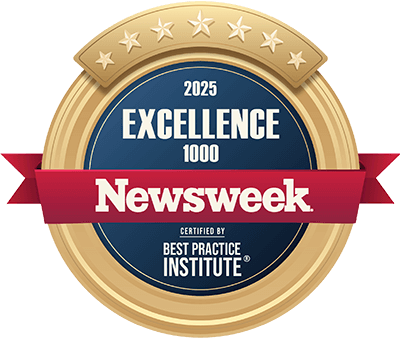CRM Implementation Plan
A Guide with Steps, Project Roles, Costs and a Sample Tech Stack
Since 2008, ScienceSoft has been implementing CRM solutions and helping businesses achieve excellence in customer relationship management.
CRM Implementation: Highlights
CRM implementation allows you to collect customer data from all touchpoints and have this data at hand for in-person and digital customer communication.
Our CRM implementation guide will be useful for any company that wants to take a tried-and-true track and be prepared for all decisions it will need to make. Let’s start with the highlights, where we summed up the key thoughts.
- CRM implementation steps: discovery, conceptualization, platform selection, project planning, development, data import, launch and user training.
- Required team roles: business analyst/consultant, CRM developer, testing engineer, project manager.
- Costs: between $15,000 (for 10+ employees) and $250,000 (for 1,000+ employees). Answer a few questions about your business needs, and our consultants will provide you with a custom quote.
- Implementation models: in-house CRM development, your team augmentation with third-party talents and full outsourcing.
- How ScienceSoft can help you: CRM consulting and end-to-end CRM development. Having delved into CRM projects across diverse companies, we've discovered that this solution isn't just about managing customer data but a powerhouse for streamlining daily tasks, saving valuable time, and empowering intelligent forecasting capabilities.
- Benefits of CRM implementation with ScienceSoft: vast expertise, flexible development pace, guaranteed customer data security, transparent communication.
Industries with Unique CRM Requirements
CRM functions may differ a lot, and our industry-specific tutorials will help you plan your CRM system.
Healthcare
Learn what services you can provide to patients with the help of a CRM.
Omnichannel retail
Leverage digital and non-digital customer data to get a holistic customer view.
Manufacturing
Find out how CRM can help you plan production load accurately.
CRM Implementation Plan
Commonly, we break a CRM project into 7 steps. All of them are necessary to get a functioning and effective CRM.
1.
Discovery
Now, you are at a starting point with a general assumption that a CRM will help you manage customer relationships and maybe a general idea of CRM functions you want to have. Our goal is to study your business processes very attentively to understand the problems a CRM must solve. Our action plan for this stage is:
- To collect maximum information on your current situation: interview the team, study process guidelines, look at the KPIs.
- To elicit key efficiency gaps, such as time wastes, error-prone actions and error consequences, inability to perform certain actions due to the lack of tools.
- To think beyond possible problems and also outline promising opportunities a CRM can create (e.g., describe all marketing channels if you envision a marketing module in your CRM).
At the discovery stage, we find it really important to engage not only stakeholders from the C-suite, but employees who actually perform the processes we aim to improve. Thus, we understand their work routine and perceive their prevailing emotions to work. If we sense boredom, irritation, frustration, we dig deeper into the reasons and consider if process automation enabled by a CRM can be a solution.
2.
Conceptualization
We summarize all the findings from the discovery stage and plan functional and non-functional requirements for your CRM. As a result, we have a full specification to hand in to CRM developers.
A high-level checklist of functional CRM requirements:
- Lead generation, qualification and distribution
- Sales pipeline management
- Quote and proposal management
- Customer data aggregation and segmentation
- Customer service
- Customer self-service
- Field service
- Customer loyalty management
- Marketing campaign management
- Knowledge management
- Document management
- Business intelligence and reporting
A checklist of non-functional CRM requirements:
- Security and confidentiality of customer data, access security
- Usability
- Performance
- Portability (the need for mobile CRM apps)
- Localization (to different languages, currencies)
- Frequency of data synchronization
- Scalability
Requirements may come into conflicts, which we split into two groups: conflicts of interest (when interests of different stakeholders or teams clash) and conflicts of technical capacity (when interests of stakeholders or teams are technically unfeasible). It is important to detect and resolve all conflicts at the stage of CRM conceptualization to ensure untroubled CRM performance and usability.
3.
Platform selection
Trying to apply your requirements to all market-available CRM platforms is arduous. To optimize the effort, we narrow down the initial list to 4-5 CRM platforms we know and use, and compare them by the following criteria:
- Functional scope.
- Customization flexibility.
- Ease of use.
- License cost.
- Deployment options.
- Security.
If the requirements are too narrowly specific and neither CRM platform proves fitting, we check the feasibility of custom CRM development. It may sound like a big deal, but custom development often turns out more cost- and time-effective than re-engineering an unfitting platform.
4.
Project planning
This is an organizational stage when we:
- Assess the cost and duration of CRM implementation.
- Assemble a development team.
- Plan a project roadmap.
- Agree on communication and reporting schedules.
5.
Development
At this stage, we tune a default CRM platform according to the functional specification created earlier. The scope of work covers:
- Setting up security roles and permissions.
- Configuring languages, entities, fields and layouts.
- Creating custom entities and forms.
- Setting up custom business logic and workflows.
- Implementing a data storage solution.
- Integrating a CRM with data storage and other corporate systems and tools for data exchange.
- Testing the functionality, performance, usability and security of the system.
If we are to deliver a custom CRM, we create all functional modules from scratch and perform all the necessary integration and testing activities.
6.
Data import
When your CRM is ready, you need to upload historical customer data there.
How ScienceSoft approaches data import: We start with the inventory of all systems where customer data is stored now, extract it and aggregate in a single environment. Then we bring the data to a unified view, de-duplicate it and launch the import.
7.
User training
User training can be provided in different formats:
- On-site sessions.
- Live presentations with Q&A sections.
- Training materials for self-learning.
Best practice: We always offer to complement the theory with training tasks to add an element of hands-on practice to the training.
Is CRM Implementation Easier with a Competent Partner?
Sure! If you team up with ScienceSoft, you won’t have to drive and control the progress of your project. We work as a self-managed team but maintain full transparency about a project plan, the status of the tasks, possible risks and challenges.
Since 2008, ScienceSoft has been providing consulting and development services for companies that want to implement a CRM.
One of our clients whom we helped with CRM implementation says:
AITC, and me personally, has worked with ScienceSoft on both product development and consulting engagements with a focus on mobile and CRM. We have experienced great cooperation from management in both departments, quick understanding of requirements, deep technical skills from assigned resources, and the company's commitment to time, price, and quality.
Knut Vonheim, Client Partner
About ScienceSoft: Our Experience and Achievements
- 36 years in IT.
- 750+ IT experts on board.
- About 4,200 success stories.
-
160+ testimonials from our valued clients.
- Experience in designing and implementing all kinds of software for customer relationship management: all-around CRM systems, loyalty management modules, AdTech and MarTech software, contact center software.
Our awards, certifications, and partnerships
Assembling a Team for CRM Implementation
The backbone of your team
Extra roles for custom CRM development
Do You Need the Whole Team In-House?
You may have as much flexibility in outsourcing your CRM implementation as you need. Take a look at our comparison chart and see that in-house development is even not the most favorable sourcing model.
ScienceSoft Adds Even More Benefits to Outsourcing Model
Breadth of expertise
With a team of 750+ IT experts, we can fully staff an end-to-end CRM project.
Guaranteed data security
Our data security management system meets the international standards of ISO 27001.
Flexible development pace
We are ready to start with an MVP and evolve your CRM incrementally while you already use it for your process automation.
Transparent communication
You don’t get cut off from the project – we set up plans together and keep you updated on the project progress. However, you can fully trust the organization and control of daily work to our project managers.
CRM Implementation Cost
The cost of CRM implementation ranges widely between $15,000 and $250,000. Here is a scale of costs from ScienceSoft’s projects.
From $15,000
CRM for 10+ employees
About $250,000
CRM for 1,000+ employees
About ScienceSoft
ScienceSoft is an IT consulting and software development company headquartered in McKinney, Texas. Since 2008, ScienceSoft has been providing CRM services and helps businesses make the best use of their customer assets to earn customer trust and loyalty.


